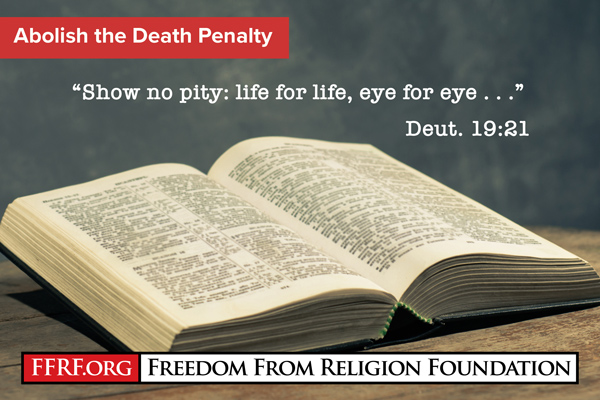
The Freedom From Religion Foundation is insisting that Alabama amend its execution protocol favoring Christians after a Muslim inmate was denied the right to have his imam present at his execution.
As the policy privileges Christian inmates above all others, FFRF is requesting that the Alabama Joint Legislative Prison Committee urge Holman Correctional Facility to allow condemned inmates to select any individual to be in the execution chamber with them — whether that person be a priest, imam, rabbi, celebrant or simply a friend.
FFRF members from across the country, including Alabama, reached out to express shock and outrage over the blatantly unconstitutional circumstances surrounding the recent execution of Domineque Ray. Ray was a death row inmate at Holman Correctional Facility in Alabama, and was, by all accounts, a devout and practicing Muslim.
When Ray met with the Holman warden to discuss the execution procedures,he learned that the prison chaplain, a Christian minister, would be in the execution chamber during his lethal injection.
As a non-Christian, Ray understandably objected to the chaplain’s presence and requested that his imam be present instead, a request that Holman Correctional Facility refused to accommodate. Instead, the prison agreed to a “compromise” wherein the chaplain would not be in the chamber during execution, but Ray would still not be permitted to have his imam present.
Ray filed suit in federal district court for claims under the Religious Land Use and Institutionalized Persons ACT (RLUIPA), and the Free Exercise and Establishment Clauses of the First Amendment. The district court dismissed the suit, but the 11th U.S. Circuit Court of Appeals reversed the lower court’s ruling, issuing Ray a stay of execution. The U.S. Supreme Court then overturned this judgement on procedural grounds, and he was subsequently executed on Feb. 7.
FFRF Robert G. Ingersoll Legal Fellow Colin McNamara has written to the Alabama Joint Legislative Prison Committee requesting that it look into the policies and procedures at Holman to ensure that the rights of conscience of all inmates are safeguarded, regardless of their religious or nonreligious beliefs.
“As government entities, prisons are bound by the Establishment Clause not to show preference for any particular religion or religion in general,” McNamara writes in his letter to Chairman Cam Ward. “Holman’s current policy of allowing only the Christian chaplain into the execution chamber violates this most basic constitutional mandate.” Simply put: “If Ray were a Christian, he would have a profound benefit; because he is a Muslim, he is denied that benefit,” McNamara quotes the 11th Circuit.
While the Supreme Court reversed the 11th Circuit on procedural grounds and hurried the execution of Ray, the gaping constitutional violation of granting a special privilege to Christian inmates remains unresolved.
“While it may be too late for Domineque Ray, rest assured there will be others,” McNamara adds. “There is nothing to prevent any of the 175 inmates currently sitting on death row from bringing a timely lawsuit and having the policy struck down once and for all, at the cost of the state’s time, resources and taxpayer dollars.”
But the greatest injustice is that the death penalty exists at all, maintains FFRF Co-President Annie Laurie Gaylor. She calls it a blight on the federal government and the 30 states with capital punishment still on the books. “The death penalty derives in the Western world from barbaric injunctions in the Old Testament, shared in common by the many Islamist nations such as Saudi Arabia, Iran and Iraq that still practice it. It’s time to end the death penalty in the United States and join more than 120 enlightened nations that have abolished it by law or by practice,” she adds.
The Freedom From Religion Foundation is a national nonprofit organization with more than 31,000 members across the country, including in Alabama. FFRF’s purposes are to protect the constitutional principle of separation between church and state, and to educate the public on matters relating to nontheism.

